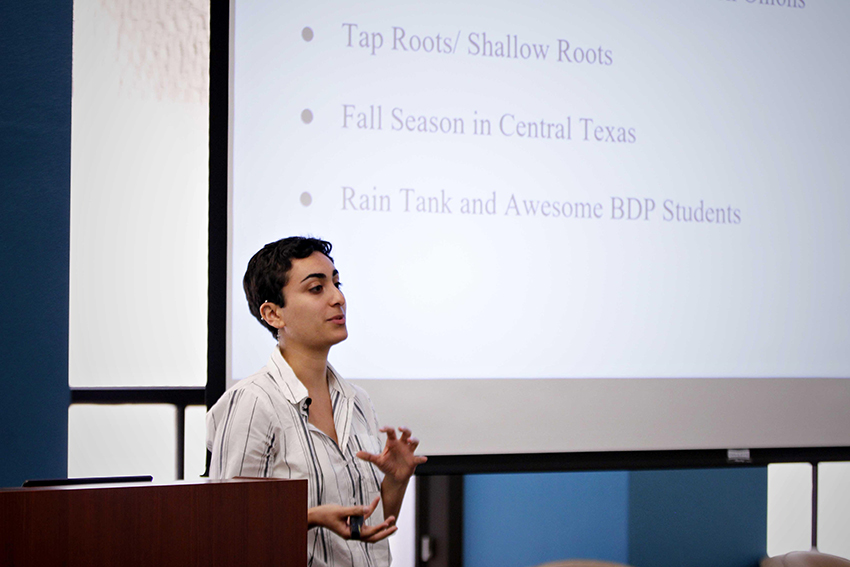Finding fresh, healthy food can be an issue in the Austin area, particularly in lower-income communities. Economics senior Joy Youwakim is working to change that.
Youwakim grew vegetables on a municipal landfill in Del Valle, a suburb southeast of Austin about ten miles from the UT campus, to see if food grown on a landfill is safe to eat. One goal of her project was to study how the landfill garden could help the surrounding disadvantaged community.
People that live around landfills are usually lower-income, which makes those communities less likely to have access to healthy produce, according to Youwakim. This made Del Valle the perfect target for her research.
“Half of the people in Del Valle are unemployed,” Youwakim said. “It’s also in a food desert, meaning there are no major food stores in the area. A population like that could very much use the landfill’s help.”
How much help it could provide was answered by Youwakim. She created a mathematical model to predict the possible agricultural growth on the landfill.
“We scaled a similar community garden and calculated that we could grow 1.7 million pounds of produce in Del Valle,” Youwakim said. “We could service about 30,000 individuals from food grown on the landfill.”
On April 5, Youwakim was the first undergraduate student to present her research as part of UT Libraries’ ongoing Research + Pizza series. The series brings together UT students and researchers in an informal setting, allowing researchers to present their work and engage in discussions with the attendees.
Economics senior Eduardo De La Garza, who attended the event, said the landfill garden and community of Del Valle is an odd marriage, but it’s one that seems to work.
“The landfills are already in areas where the people are in need,” Garza said. “So people in poor places can grow their own food that increases the property value, which helps to build a sustainable community.”
Garza said another project started on the landfill, one that harnesses methane given off by the trash to produce electricity, could contribute to raising the economic status of poorer communities by giving them sustainable projects to employ, power and feed their residents.
Economics senior Jorge Morales-Burnett, an event attendee, studies urban development. He said that organizing an urban environment spatially is difficult, but if done successfully can help the community produce income and create jobs.
“I think it’s interesting how you can start to close the economic divide between the communities using land that’s just sitting there, vacant, almost for free,” Morales-Burnett said.
The inaccessibility of transportation leads to the issue of food insecurity in Del Valle. Since many in Del Valle don’t have access to public transportation, they can’t easily access fresh food, according to Morales-Burnett.
“It’s not a problem because the landfill is so close,” Morales-Burnett said. “You could organize carpools to get them there. It really becomes more feasible because the landfill is already in the area.”
Burhanuddin Calcuttawala, Plan II sophomore, was drawn to the food, but stayed because the topic caught his attention.
“I wondered why not make some use out of this land, I mean it’s not of use to anybody just sitting there,” Calcuttawala said.
He also wondered whether private or public control would best serve the project’s interests.
“(Youwakim) mentioned she thought it would be better that the city could handle the project,” Calcuttawala said. “But I think it would be better if it were privatized, not only to turn a profit but also help employ people in the area.”
Youwakim is handing over her results to the City of Austin, who will do more testing of the landfill farm and allocate resources for its own employees to maintain the project.
While the city moves forward with the project, Youwakim is graduating. She said she plans to go to graduate school and continue interdisciplinary research of mathematics and agriculture. She plans to keep up with the city and work to develop her work across Texas and, eventually, the entire country. For now, she is working to get her research published in a journal.
“My dream is that the U.S. is covered in landfill gardens,” Youwakim said.















